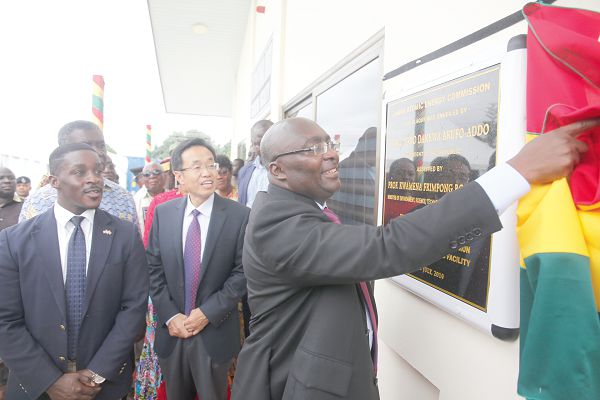
Veep commissions facilities to improve research at GAEC
The Vice-President, Dr Mahamudu Bawumia, has commissioned three facilities at the Ghana Atomic Energy Commission (GAEC), a scientific, research and development institution in Accra.
They are a low-enriched uranium core research reactor constructed with support from the United States government, a miniature neutron source reactor training facility and a laboratory building for the Radiological and Medical Sciences Research Institute, both built with funds from the government of Ghana and GAEC.
Significance
Addressing a durbar at GAEC yesterday, Dr Bawumia said the international miniature neutron source reactor training facility would be used together with the research reactor to boost the training of scientists and engineers from various countries.
The neutron source reactor, which was acquired under a tripartite agreement among Ghana, China and the International Atomic Energy Agency (IAEA) in December 1994, is a low power commercial type reactor of a miniature neutron source designed with a maximum power of 30 kilowatts.
However, Dr Bawumia explained that “the new radiological and medical sciences research institute laboratory building was completed at a cost of GH¢534,413, with GH¢457,375 coming from the government. An amount of GH¢77,037 was also contributed from GAEC’s internally generated funds”.
He said it was gratifying that Ghana had instituted the required measures to prevent, detect and respond to theft, sabotage, unauthorised access and illegal transfer of nuclear materials, especially given the increasing threat of terrorism in recent years, stressing that “we are aware of our responsibilities in protecting people and the environment from radiation”.
He said three months ago, the government also released $300,000 to support the site selection process for a nuclear power plant.
In addition, the Vice-President said, the Cabinet had approved the setting up of an organisation to oversee the construction and operation of Ghana's first nuclear power plant.
Commendation
Dr Bawumia commended GAEC for its contribution to the development of the country through the application of nuclear science and technology in the areas of health, agriculture and industry, adding that through its efforts, two radiotherapy centres were also established at the Korle Bu and the Komfo Anokye Teaching hospitals for the treatment of cancer.
He further explained that new fuel was expected to be in operation for the next 40 years and would serve as an additional resource to support the needed basic training of the required manpower for the country’s ongoing nuclear power programme.
In that regard, he said, Ghanaian scientists, in collaboration with scientists and experts from the Argonne and the Idaho national laboratories of the United States Department of Energy, the IAEA and the China Institute of Atomic Energy, undertook the process of converting Ghana’s high-enriched uranium fuel reactor to low-enriched uranium fuel.
The conversion of the reactor was successfully completed in August 2017 with a total expenditure of $22 million.
Ghana is the first country, apart from China, to have successfully completed the conversion of this type of reactor.
Objective
The Chairman of the Board of GAEC, Dr Kwaku Aning, said the ultimate objective of the country’s nuclear project was to produce nuclear electricity, with the long-term objective of training and developing manpower for the future acquisition and operation of a nuclear power plant.
He said the establishment of the laboratories would also help the centre actualise its vision of becoming a leading medical research institution in the country.
He lauded the efforts of the scientists and engineers of the commission for their coordinated research and expressed appreciation to the US government, China and the IAEA for their continued support.
For his part, the Director General of GAEC, Prof. Benjamin J.B. Nyarko, said aside from Dr Kwame Nkrumah, who laid the foundation stone for the establishment of GAEC in 1964, and Col Ignatius Acheampong, who visited the site in 1976, Dr Bawumia was the next high-ranking official of state to visit the commission.
He appealed to the Vice-President to help address the issue of encroachment of GAEC lands and also make the institution an autonomous university.
The GAEC engages in research in radiation medicine, cancer, medical imaging, diagnostic molecular biology and nutrition, with the objective of becoming a leading medical research institution in Ghana and Africa.
Initially, it operated on high-enriched uranium fuel that had been used for over 22 years without any incident.
